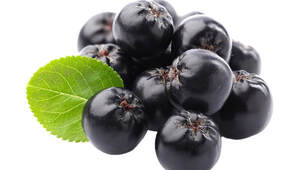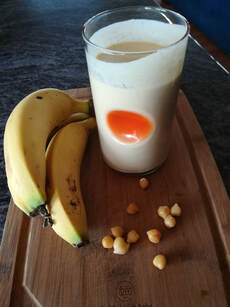|
|
 Aronia is also known as chokeberry (Aronia melanocarpa) which is an antioxidant-rich fruit that is commonly consumed in Eastern Europe and Russia. Aronia have been used in folk medicine by Native Americans as a treatment for the common cold. This little berry is said to offer a range of health benefits related to oxidative stress. Oxidative stress is a destructive process linked to many chronic diseases. It occurs when DNA-damaging free radicals overwhelm the body. Aronia is thought to fight oxidative stress by providing potent antioxidants known to knock out free radicals and offer additional health benefits. Oxidative Stress Aronia may be useful in treating conditions related to oxidative stress. Free radicals can damage your DNA which may contribute to the development of many diseases, including cancer, heart disease, diabetes, stroke, and other conditions. In a research review published in 2010, scientists evaluated 13 studies, finding that chokeberry's mixture of procyanidins, anthocyanins, and phenolic acids "constitutes one of the most potent natural antioxidants." Authors of a 2017 study also examined the antioxidant benefits of chokeberry. They concluded that the berries have the potential to provide both medicinal and therapeutic benefits and may contribute to the prevention of chronic diseases including metabolic disorders, diabetes, and cardiovascular diseases. Metabolic Syndrome In a small study published in 2010, researchers found that aronia berry extract may benefit people with metabolic syndrome—a cluster of health problems linked to increased risk of heart disease and diabetes, including excess belly fat, high cholesterol, high blood pressure, and inflammation. For two months, 25 patients with metabolic syndrome took 100 mg of chokeberry extract three times daily. Study results showed that the patients experienced significant decreases in blood pressure, C-reactive protein (a marker of inflammation), and LDL ("bad") cholesterol. Another preliminary study evaluated the effects of chokeberry extract on obese mice who consumed a high-fat diet. Researchers found that the mice treated with the extract showed decreases in body weight, triglyceride and cholesterol levels, and improved insulin sensitivity. It is too soon to tell, however, if these benefits will occur in a human body. Diabetes Chokeberry may help keep blood sugar in check in people with diabetes, suggests a small study published in 2002. After drinking 200 ml of a sugar-free, artificially sweetened chokeberry juice daily for three months, diabetes patients showed a decrease in fasting blood sugar levels. Chokeberry juice also appeared to reduce total cholesterol levels. A review of studies was published in 2017 in the journal Frontiers in Nutrition where researchers examined evidence linking chokeberry to antidiabetic effects. The study concluded that there is evidence suggesting that the berries' antioxidants have potential in the prevention and treatment of diabetes. Other preliminary studies are investigating the potential of using chokeberry extract in the treatment of hypertension and related cardiovascular conditions. Some people also use chokeberries or chokeberry supplements to treat conditions including:
There is not enough evidence to know if chokeberry fruit or chokeberry extract can aid in the treatment of these conditions. Aronia is found in many forms. A common favourite is to drink aronia berry juice or as a concentrated juice, where you take a small shot per day. It can be found as a powder or flour which you can use in baking, capsules even as vinegar which you can use in salads. It has a tart taste similar to that of sour cherries. Possible Side Effects Experts suggest that drinking chokeberry juice or taking chokeberry extract as medicine is possibly safe for most adults. However, some people may experience side effects including constipation or diarrhea. People with diabetes should exercise caution when using chokeberry. The fruit can lower blood sugar so it is important to watch for signs of low blood sugar and monitor your blood sugar carefully. Women who are pregnant or breastfeeding should also exercise caution with chokeberry or chokeberry extract as there is not enough evidence to know if it is safe. List of Scientific Studies Specific to Diseases
1 Comment
When you’re feeling down, it can be tempting to turn to food to lift your spirits.
However, the sugary, high calorie treats that many people resort to have negative consequences of their own. While many of us reach for stodgy comfort foods when the blues kick in, snacking on mood-boosting nutritious foods will help to keep you healthier and happier too. Thankfully, there are some lifestyle solutions that don’t cost a fortune, and can be done from home that can help anyone struggling with depression, anxiety and stress. Here are some foods and lifestyle solutions to boost your moods:
Anxiety Causing Foods to Avoid High sugar foods, caffeine and alcohol provide short-term relief from feeling anxious. However they can intensify the feeling of anxiety or stress if too much is consumed Food Ideas
 Did you know chickpeas, also known as garbanzo beans, are one of the oldest and most popularly consumed crops in the world. Chickpeas have been a part of certain traditional diets for over 7,500 years! They belong to the legume family and offer a range of health benefits. Chickpeas help to increase satiety, boost digestion, keep blood sugar levels stable, increase protection against disease and more. In addition they are very high in protein, vitamins and minerals. Chickpeas Nutrition Facts: Just one cup serving of chickpeas contains (in daily recommended values):
They are also quite low in carbohydrates with only 35 grams in a one-cup serving. In addition, they are quite low on the glycemic index which is estimated to be 23. Chickpeas can help benefit your health in the following ways: Helps Control Blood Sugar Levels: Chickpeas, like all legumes, are a form of complex carbohydrate that the body is able to slowly digest and use for energy. Chickpeas contain starch, which is a slow burning carbohydrate that the body does not react to by suddenly spiking glucose in the blood (1). Increases Satiety and Helps with Weight Loss: Chickpeas are high in both protein and fiber, which helps to make you feel full and to curb food cravings and unhealthy snacking. Studies have shown that consuming fiber is correlated with having a lower body weight (3). Chickpeas help you lose weight by making you feel satiated and hence less likely to over snack on healthy or unhealthy junk foods between meals. Improves Digestion Thanks to a High Fiber Content: Chickpeas are very high in fibre with roughly 6-7 grams per half cup serving. Fiber facilitates in healthy digestion by increasing the healthy bacteria in the gut and decreasing the unhealthy bacteria. It also combats constipation which ensures the quick removal of toxins and waste from the body. The high amount of fiber in chickpeas is responsible for making you feel full, aids in heart health, helps to control blood sugar levels, guards against cancer, heart disease, diverticulosis, kidney stones, PMS, obesity, and more. Helps Protect Against Heart Disease and Cancer: Chickpeas have been shown to help balance unhealthy cholesterol levels, to reduce hypertension, and to protect against heart disease. Beans help to keep the arteries clear from plaque build-up, maintain healthy blood pressure levels, and decrease the chances of cardiac arrest and stroke. In fact studies show that having just one daily serving (about 3/4 cup cooked) of beans of any kind can help to decrease chances of a heart attack and to help balance “bad” LDL cholesterol. Consuming beans has also been shown in studies to have protective benefits against cancer, in particular colon cancer, due to their high fiber content (6). In studies, garbanzo beans were demonstrated to stall cancerous cells from further forming (7). Provides Essential Vitamins and Minerals: Chickpeas nutrition boasts high levels of iron, zinc, folate, phosphorus, and B vitamins, all of which are especially important for vegetarians and vegans who may be lacking in these essential nutrients due to avoiding animal products. Folate: is one of the B-vitamins and is needed to make red and white blood cells in the bone marrow, convert carbohydrates into energy, and produce DNA and RNA. Adequate folate intake is extremely important during periods of rapid growth such as pregnancy, infancy, and adolescence. It is also beneficial to athletes. Zinc: this mineral may enhance immune function, stabilize blood sugar levels, and help keep your skin, eyes, and heart healthy. Zinc deficiency can include frequently getting sick with colds, leaky gut syndrome, consistent digestive problems like diarrhea, poor eye health, infertility, thinning hair, and even stunted growth in children. Magnesium, Manganese and Vitamin B6: Chickpeas are loaded with these 3 nutrients which help reduce common symptoms of PMS (pre-menstrual syndrome) and are also vital for athlete’s optimum performance. Protein: Protein plays an important role in nearly every function in the body, from our vital organs, muscles, tissues and even hormone levels. Consuming enough healthy protein helps you to naturally slow ageing, create hemoglobin and important antibodies, to control blood sugar levels, help with muscle building and maintenance, give us lasting energy, fight bacteria, make us feel full, and help to heal wounds and injuries too. Chickpeas have about 15g protein per cup of cooked chickpeas. Those who are most at risk for not consuming enough protein are children, vegans and vegetarians. Protein deficiency can result in muscle weakness, fatigue, low energy, eye problems such as cataracts, heart problems, poor skin health, imbalanced hormone levels and more. Chickpeas are often eaten as a stew cooked with other vegetables or as a dip called hummus, roasted as a crunchy snack or as I have discovered lately the new trend in New York and London are hummus shakes ideal for the whole family for adults, kids, babies and teens ! TIP: When chickpeas are combined with a source of healthy fat, like tahini for example which is the case with hummus, nutrient absorption is further increased. |
AuthorBarbara is a qualified nutritionist offering Health, Nutrition & Lifestyle Counseling. She gives Healthy weight loss advice and promotes the Mediterranean diet. She is the author of the Med Life Diet - creating healthy lifestyle habits and attitudes for life ! Archives
April 2024
|
 RSS Feed
RSS Feed
